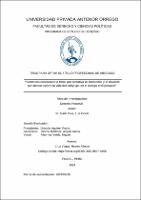Sentencia condenatoria firme por tentativa de homicidio y el divorcio por atentar contra la vida del cónyuge, en el código civil peruano
Resumen
La presente investigación se gesta a partir de la siguiente pregunta: ¿De qué
manera es necesario, una sentencia previa condenatoria firme por tentativa
de homicidio, para que se configure la causal de divorcio por atentar contra la
vida del cónyuge, en el Código Civil peruano?
En tal sentido, a partir de la selección y revisión de diversa literatura jurídica,
de la mano con los métodos adecuados, se ha podido arribar a la siguiente
conclusión principal: Teniendo en cuenta que el Derecho es una herramienta
puesta al servicio de los seres humanos en sociedad para solucionar
conflictos de la manera más justa (la cual tiene una de sus manifestaciones
en la seguridad jurídica); y, teniendo en cuenta que dicho instrumento se rige
sobre diversas garantías esenciales; la presunción de inocencia viene a
configurarse en un principio fundamental de todo aquel sistema jurídico que
se jacte a si mismo de llamarse Estado Constitucional de Derecho; en tal
sentido, se considera que no es posible que se declare fundada una demanda
de divorcio por la causal de atentado contra la vida del cónyuge, si es que
dicho atentado no ha sido previamente discutido, acreditado y declarado en el
proceso penal correspondiente. Esto además es coherente con las normas
constitucionales que pugnan por la promoción del matrimonio y la protección
de la integración familiar The present investigation is gestated from the following question: In what way
is it necessary, a prior final conviction for attempted homicide, so that the
grounds for divorce are configured for attempting the life of the spouse, in the
Peruvian Civil Code?
In this sense, from the selection and review of various legal literature, hand in
hand with the appropriate methods, it has been possible to arrive at the
following main conclusion: Bearing in mind that the Law is a tool placed at the
service of human beings in society to solve conflicts in the fairest way (which
has one of its manifestations in legal certainty); and, taking into account that
said instrument is based on various essential guarantees; the presumption of
innocence becomes a fundamental principle of any legal system that boasts of
calling itself the Constitutional State of Law; In this sense, it is considered that
it is not possible for a divorce claim to be declared founded on the grounds of
an attack on the life of the spouse, if said attack has not been previously
discussed, accredited and declared in the corresponding criminal proceedings.
This is also consistent with the constitutional norms that fight for the promotion
of marriage and the protection of family integration.
Colecciones
- Derecho [481]


